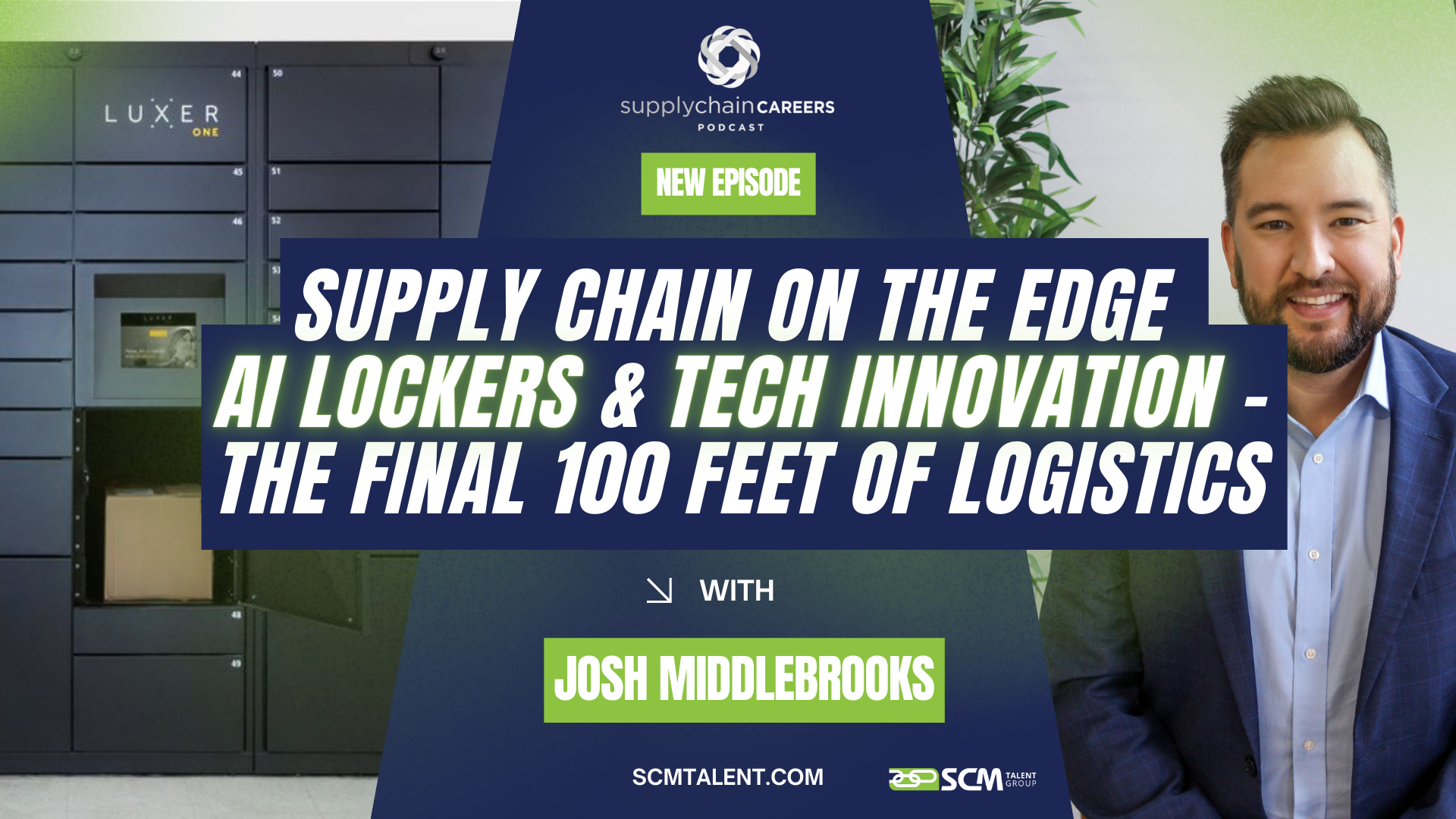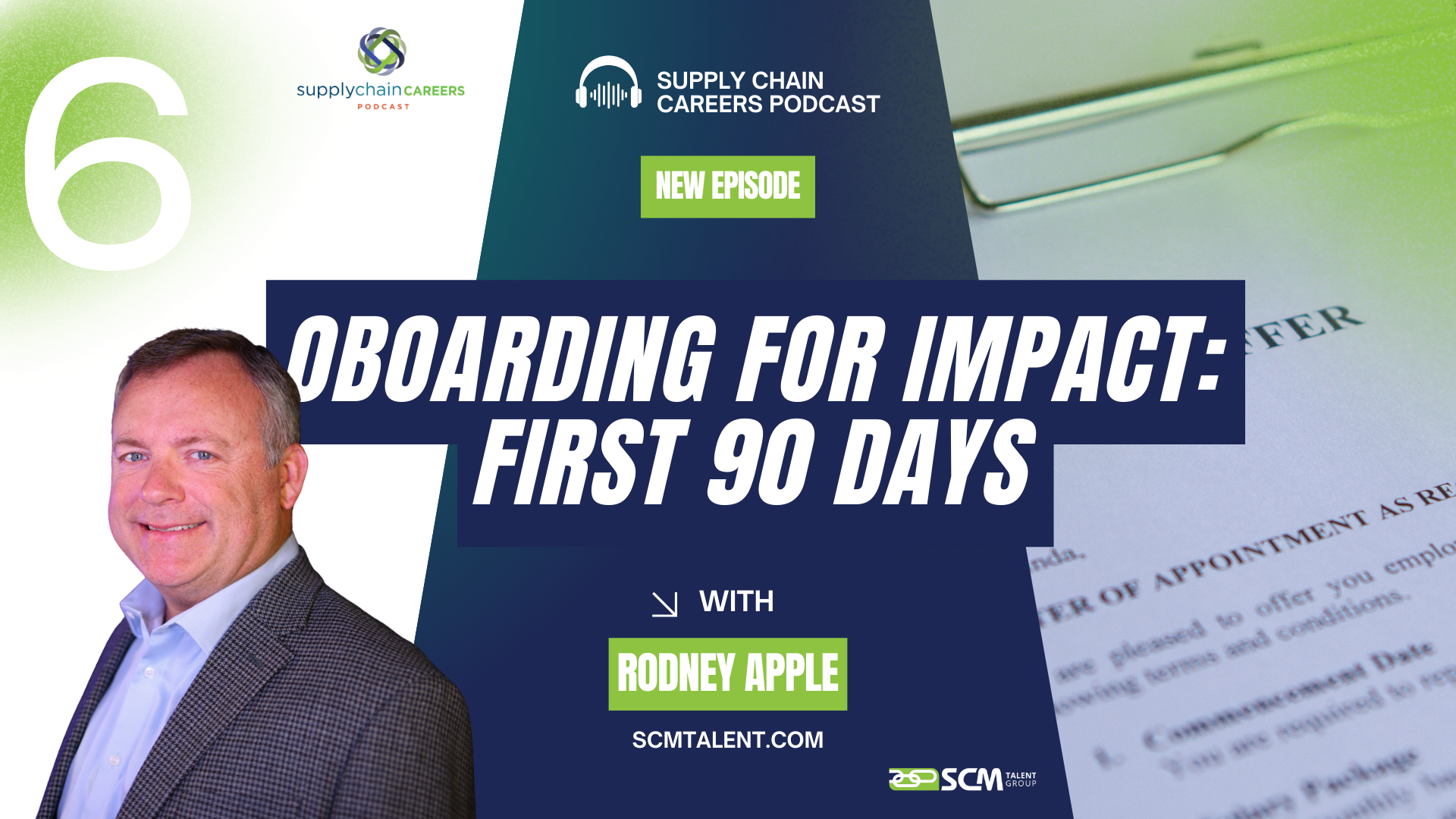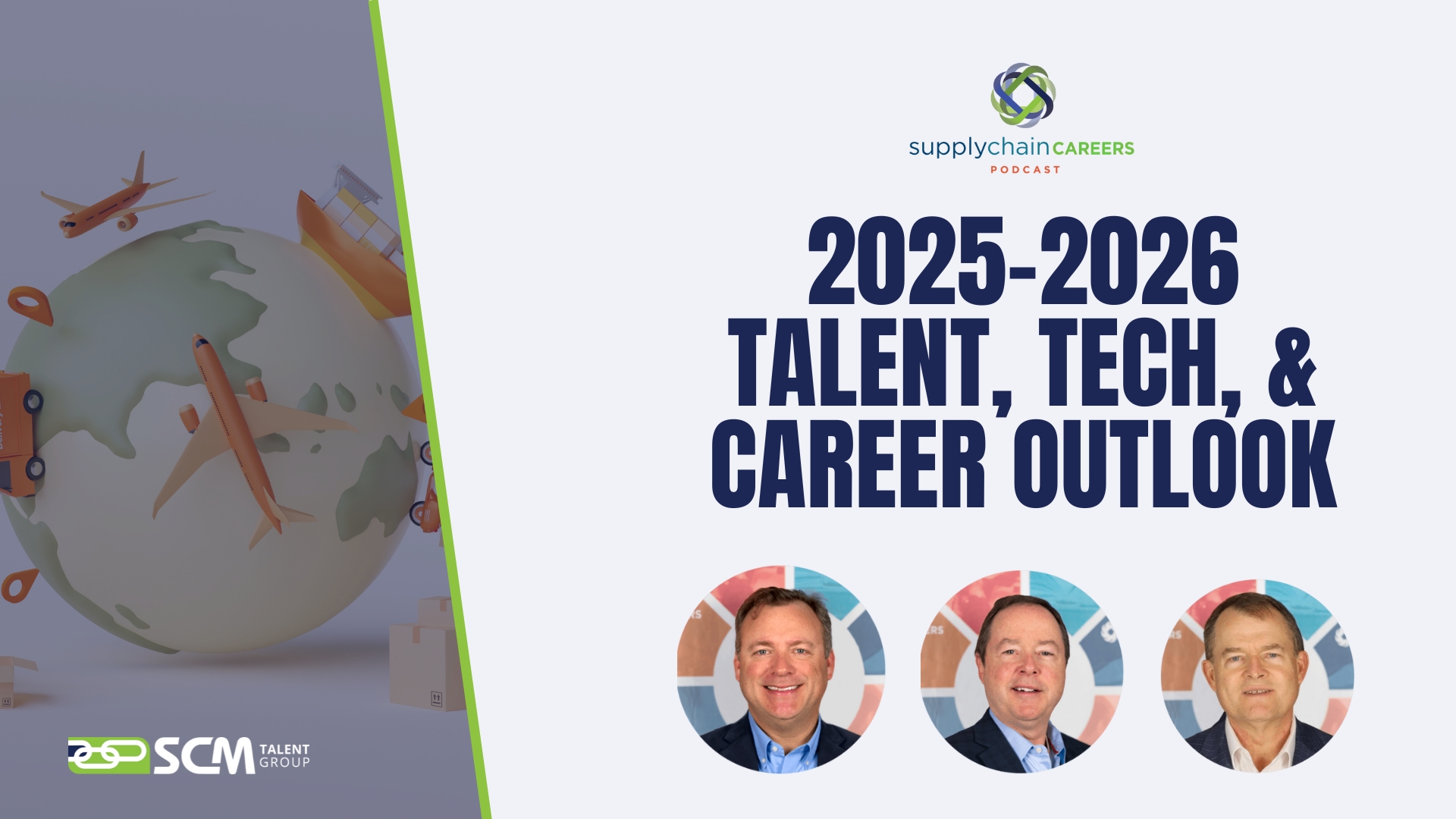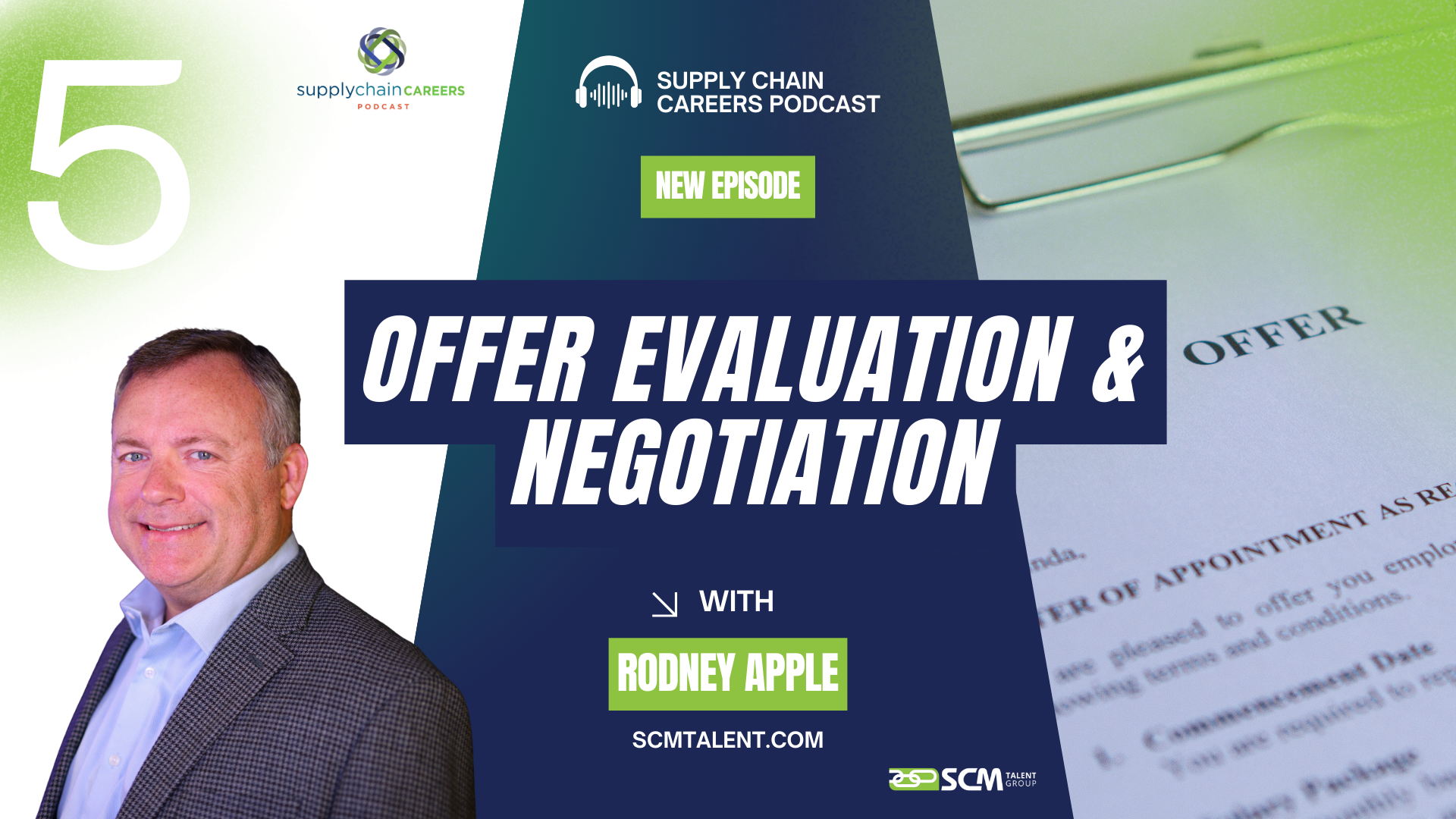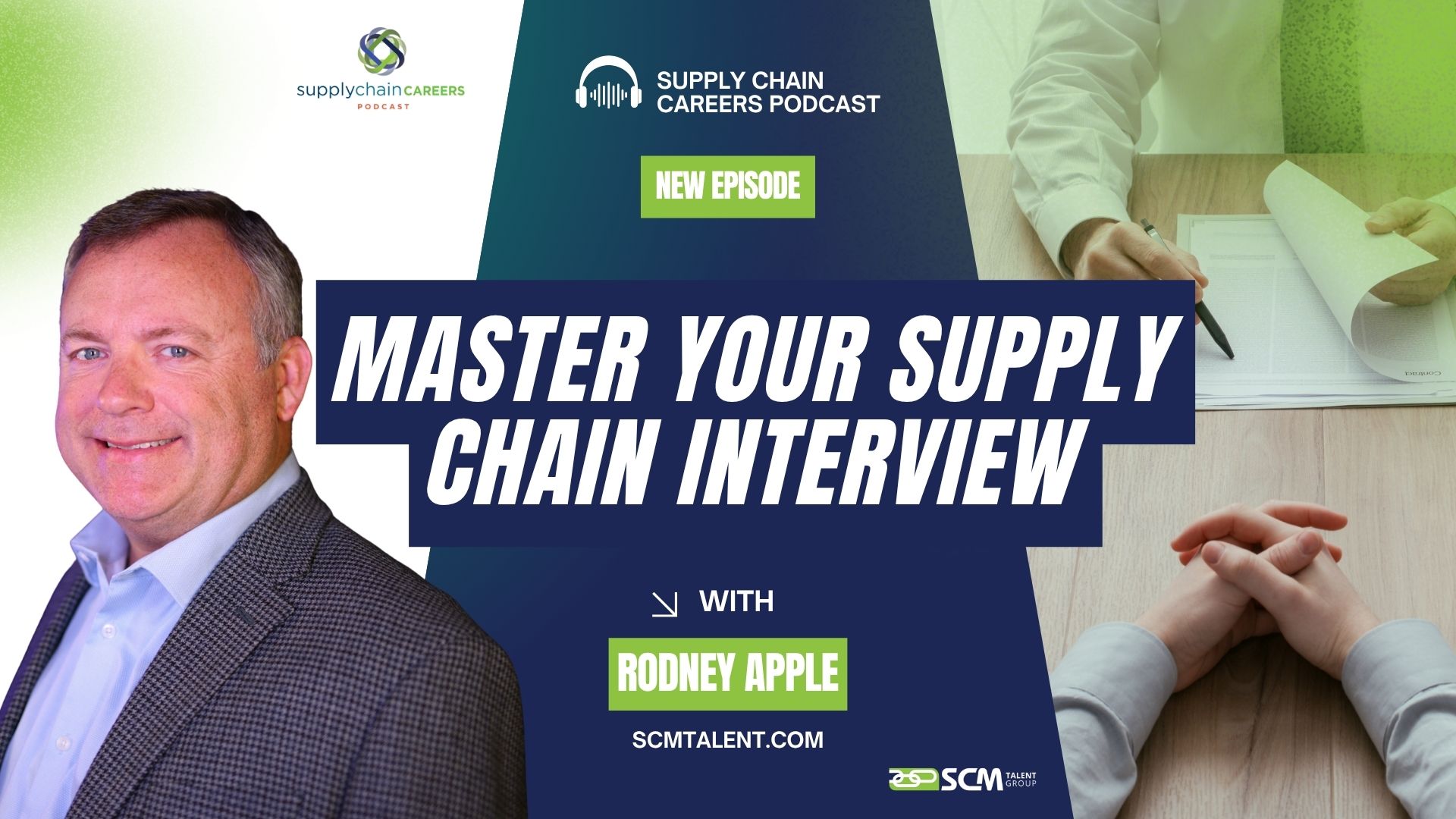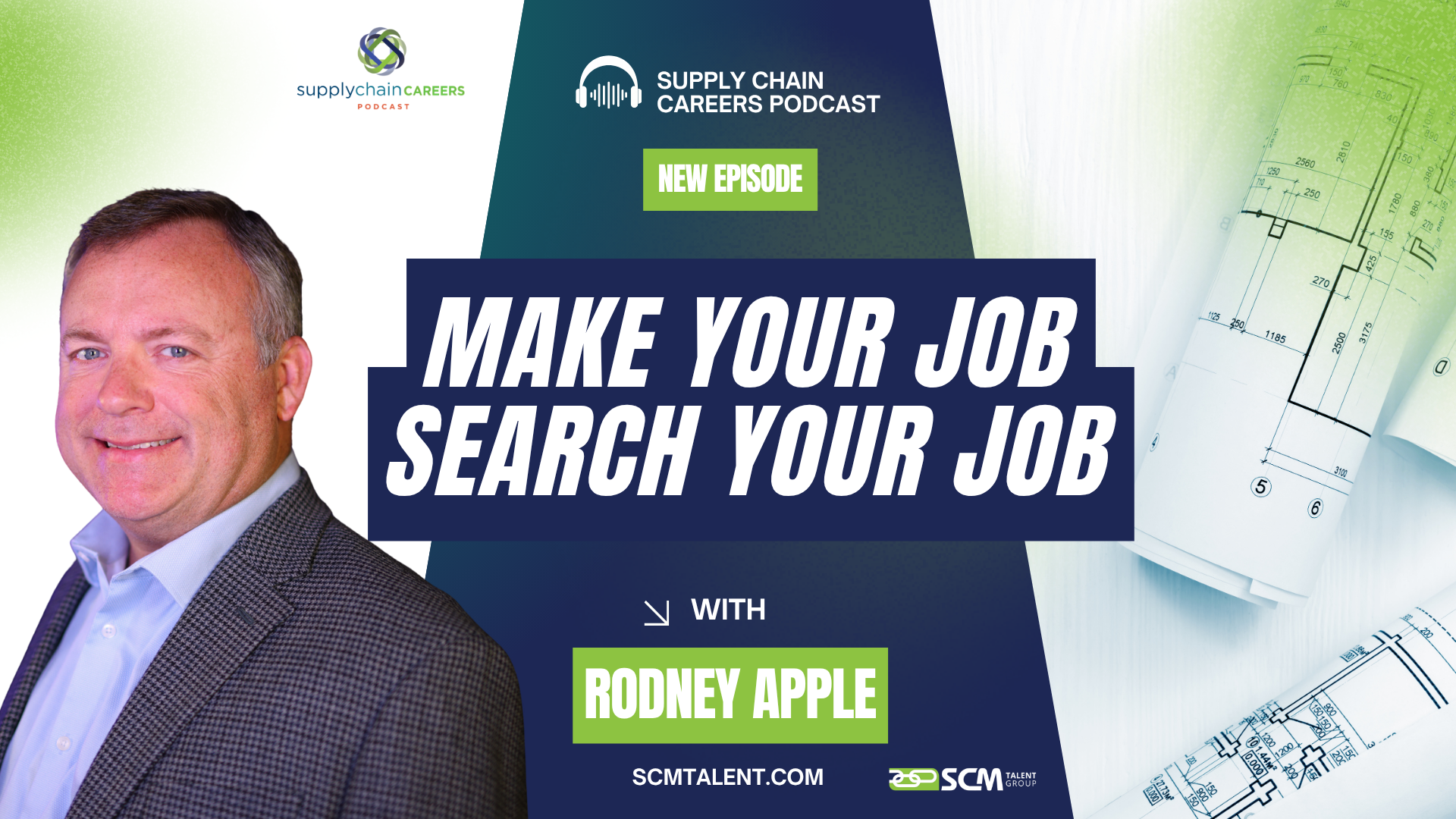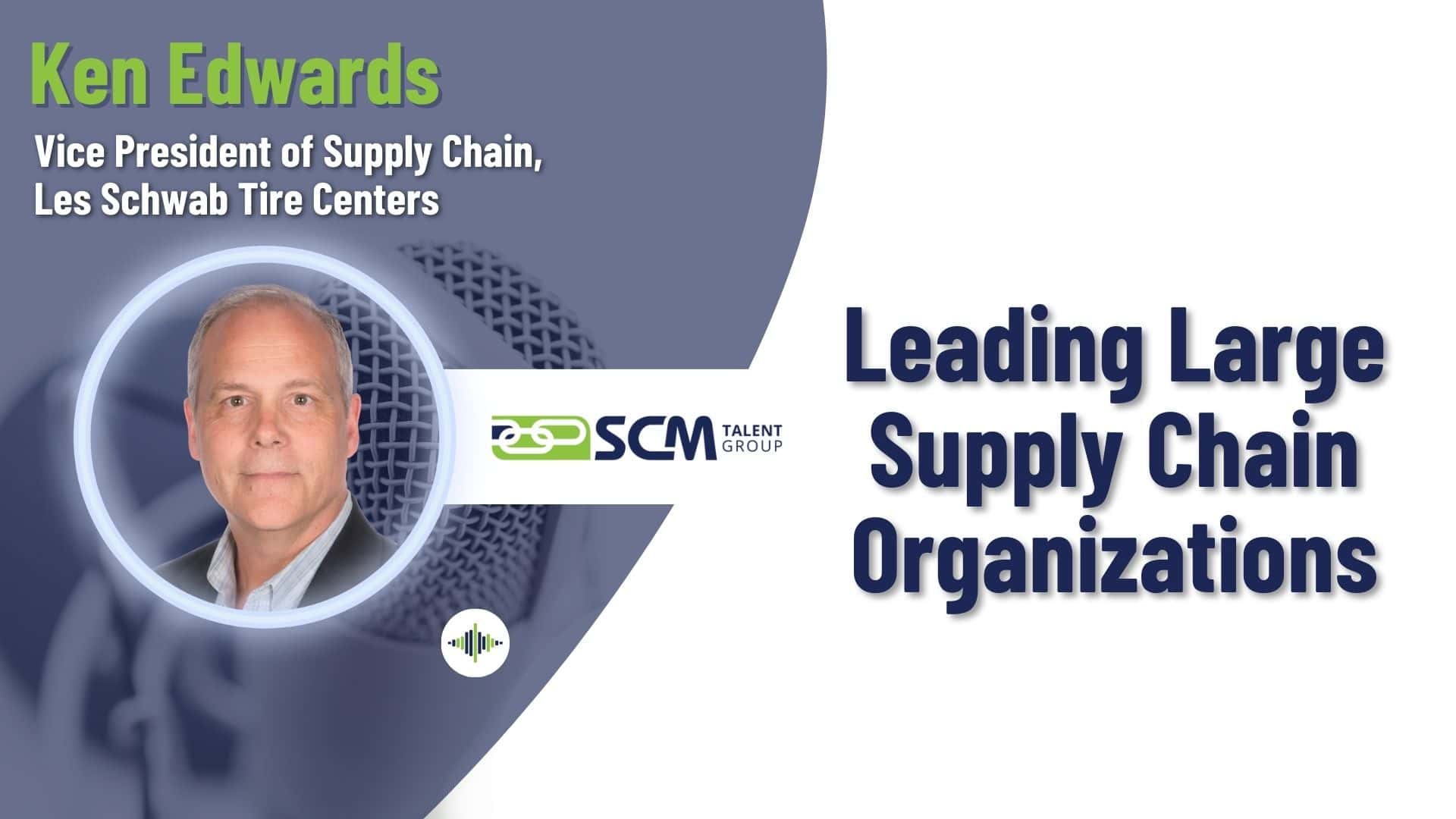
Podcast: Leading Large Supply Chain Organizations – with VP of Supply Chain at Les Schwab Tire Centers, Ken Edwards
Hosts: Rodney Apple and Chris Gaffney
In This Episode:
Our latest podcast features Ken Edwards, an expert in supply chain management with decades of valuable supply chain leadership experience. Ken helps us to understand the secrets to success behind successful multinationals like Frito Lay and Starbucks and some different lessons from smaller companies like Les Schwab.
Ken shares his invaluable insights on leadership, employee engagement, and navigating the complex challenges of supply chain disruptions, especially during the COVID-19 pandemic. He discusses the importance of approachable leadership, continuous improvement, and the strategies he employed to cultivate strong brands and successful organizations. This episode is a must-listen for anyone interested in the nuances of supply chain management and leadership excellence.
Who is Ken Edwards?
Ken Edwards is the Vice President of Supply Chain for Les Schwab Tire Centers headquartered in Bend, Oregon. He received his Bachelors of Science in Accounting from Portland State University and Masters in Business Administration from Washington State University. Ken’s supply chain career spans over 30 years with marquee brands including Frito-Lay, Starbucks Coffee, and Capgemini Consulting. Currently, he leads a team responsible for Distribution, Logistics, and Manufacturing supporting over 500 retail locations in 10 western states.
And a challenge standpoint and really, I began to develop an interest in supply chain with that first role that I had with Frito Lay in manufacturing and operations and clearly a very fast paced, challenging environment. Which made me feel like I was probably on to something. This was an area that interested me.
But the real passion came when I had an opportunity to take those experiences and leverage them when I started consulting with organizations. And that took it to a whole nother level. And at that point, I knew that supply, I’d landed in a career that I was going to enjoy for for a long time.
So can you
[00:03:21] Chris Gaffney: work. For many, frankly, big name companies in Les Schwab in Starbucks. And as you mentioned, Frito Lay. Those air strong cultures, with great leaders. You and I both have Frito in common. So there were leadership lessons to be learned and very quickly leadership lessons to be taught.So as you think about what you took away from each of those organizations from a leadership standpoint, what has stuck in And how have those kind of evolved into your kind of approach to leadership.
[00:03:55] Ken Edwards: Three major organizations that I have been able to have the opportunity to work with and for Frito Lay, Starbucks, Les Schwab strong brands and strong leadership.They each had their qualities that there were similarities between the three. But I’ll start with Frito Lay. For those that have had the opportunity to be part of the Frito Lay organization, they tend to give a great deal of responsibility to young professionals. And so you learn very quickly that the expectation is that you’re going to learn fast and you’re going to have a lot of responsibility.
The other commonality between those organizations when I think about it is quality, right? The Frito Lay is all about the quality of their product. They’re also very focused on continuous improvement, metrics. As Starbucks is as well high quality added to that some customer care.
Everybody knows what it’s like to step into a Starbucks coffee location and have them know your name. So there’s a high degree of touch and care. And then employee focus. The, I think Starbucks was one of the early adopters of benefits for part time employees. So just a very keen focus on taking care of their employees.
And then finally, Les Schwab, I have found as a smaller company, and we can talk about Les Schwab for those that are not familiar with the organization, but also a very high focus on quality customer centric, and then all about the employees too, and taking care of the employees. And ensuring their success.
So in all three of those organizations, like I said, there was a common theme of high degree of focus on quality and on people, whether that was the consumer customer or the employee. And as a result of that, that led to a style and a leadership approach that I developed over those years in each of those organizations,
[00:06:06] Chris Gaffney: people around you today, if I ask them, what is Ken’s leadership style, what are a couple of things they would likely say? [00:06:14] Ken Edwards: I’m just as likely to engage with employees and those that I work with in talking about them personally as I would talking about work. And so I think that they would characterize me as very approachable. collaborative and concerned for them as a person. And that’s not just for the employees. It also extends to our customer and those that are interacting with us on a day to day, daily basis. [00:06:46] Chris Gaffney: I like that. Obviously you’ve been at it for a while. And I guess sometimes employees are curious when you care for them equally or has more than the business. If you have to say to our audience, why has that become part of your approach to leading, over the years? [00:07:02] Ken Edwards: I often explain to folks that, you’re going to spend more time at work with me than just about with your family. And so if if we can’t get along and if we can’t share experiences and be interested in one another, then it’s going to be a tough road. Probably, it’s going to be all about work and when it’s all about work, that’s just not fun, right?So I think being that approachable leader. Being kind, being honest goes a long ways because, work by definition is work. It’s hard. And when you’re in the trenches with folks they reflect back on the fact that you do have their best interest in mind and you are approachable if they’re having a challenge.
And so I just think it leads to a much more collaborative and comfortable. environment. I guess I would characterize it that way.
[00:07:58] Chris Gaffney: That’s great. Thank you. [00:08:00] Rodney Apple: Yeah, I think segwaying into our next question around development and retention. And I think a lot of what you’re talking about leads into that, because if you treat people with respect and dignity get to know them personally, that’s going to go a long way with retention and getting them and aspiring them to want to work towards their goals and objectives.But we’d love to hear more perhaps some examples of, developing and retaining team members full disclosure. I have visited with Ken out at Les Schwab. I’ve gotten into the operations. One thing that struck out was very dedicated and loyal employee base. As you mentioned a very loyal dedication to the customer base.
Maybe unlike I’ve seen in many retailers that are out there. And then you have a very long I would say tenured employee base as well. Most of the folks there have been there for 10, 15, 20, in some cases, 30 years. You don’t see that very often in any company. And I’d love to hear the secret sauce for how you go about developing and retaining these.
and keeping them for so long
[00:09:02] Ken Edwards: It’s pretty unusual I have worked for the company 20, 30, 40 years. And I would say it goes all the way back to our founder with the company is named for Les Schwab was an individual that started the company over 70 years ago. And for those that are not familiar with the company we operate a tire retailer in the nine western states, about 7000 employees and over 500 retail locations.And in addition to really long tenure of our employees, we also have a very high customer loyalty with Customer awards and repeat customers and families and generations that continue to shop in our stores and the secret sauce that you refer to really was the perspective that the founder of the company had.
And that was if you take care of your people. If you are generous with them, if you share your profits, if you give them an opportunity to grow professionally and as a person, then they are happy, they’re motivated, and that is demonstrated when they interact with your customer. The customer recognizes that level of service that is different than the competition and therefore, as an organization, you can hold steady with your pricing and your offerings, which then generates your profits for your programs to then reinvest into your employees.
The employees then reap the benefits of those programs. And the sharing in the success of the business and they are happy and we were right back where we started, right? Happy employees giving great world class customer service generates repeat customers. and business success.
And then folks don’t want to go anywhere beyond, they’re not looking to enhance or to improve beyond that. And that’s the real secret sauce of lush swab. Ken,
[00:11:17] Rodney Apple: I think you just answered the next question we had is I refer to it as employer of choice. And Les Schwab has clearly developed that reputation.And it’s been over many years. I noticed when I left there and spoke to folks about Les Schwab everything you told me when I was there came to fruition and you have a, just a very solid reputation in the industry. And that extends out to the customers, not just as a employer of choice.
But is there any advice you’d like to share to other companies that are out there, other people listening I think what you gave is the secret sauce, but is there anything you want to add, like how they, what steps they can do, programs to to get to that place where they attract people and they have that reputation as an employer choice?
[00:12:03] Ken Edwards: Yeah. It doesn’t just happen. It really starts. And of course, this is in your profession and you see this all the time. It starts at the recruiting and the hiring. When you have a culture that is grounded and so important on how your employees feel, interact with one another and how they treat your customer, then culturally you’ve got to find that fit.During that recruiting and hiring process. If that is not in the candidates DNA, it’s very difficult to change them after hire. And so one of the benefits that Les Schwab has in that other companies that have a promote from within culture, which we do at our retail stores, is that you make that initial assessment if there’s a good fit, then they grow up, and develop internally, and they’re promoted from within all the way up to store management, and it just reinforces that culture that is needed in order to be successful. So I would say, um, spend the time during the recruiting and the evaluation to ensure that there is a really good fit. And then once they’re on board just continue to encourage and develop. Give opportunity for growth and you’ll find that your employees fit in well with that overall culture with the entire organization.
[00:13:35] Rodney Apple: Well said. It just seems a lot of other retailers haven’t quite figured out this yet. You got, you’re batting what a hundred percent promote from within and the stores for many of the levels, especially those supervisory levels. That’s so that’s. Yeah, [00:13:53] Ken Edwards: all of our store management is promote from within the organization has been fortunate enough to be able to develop the internal pipeline to sufficient levels that all of our, Store leadership is grown from within. [00:14:10] Chris Gaffney: Ken you mention Les Schwab has over 7, 000 employees and many retail locations and obviously a supply chain to support that, leadership and supply chain, if you’re a supply chain practitioner, you would say it has its own challenges but leading an extended organization, a large complex supply chain organization is a challenge in and of itself. I’d love to give you to give the audience a sense of how you’ve developed your approach to leading an extended large organization. In particular, how do you drive decision making to the right place? How do you empower and enable people to solve problems?And move the organization forward.
[00:14:51] Ken Edwards: Yeah. So for all of us that are in supply chain there’s no shortage of opportunity to be heroes, and to solve problems. My approach has been for a long time to question the status quo. We don’t wait for problems to problem solve, I like to call it opportunity solve. It’s if I challenged my team, if we haven’t looked at a process or procedure or an approach in the last 12 months Then it’s probably too late.We need to go look at it again. The continuous evaluation. And that’s what makes the supply chain profession for me exciting is that it’s never dull. It’s never constant. It’s always changing. And I promote that with, within my teams is continually look. And evaluate how it can be done better.
I Also encourage, decision making. I call it encouraging failure risk. And that might sound a little strange, but what I mean by that is if you’re not promoting risk taking with your direct reports and your employees, and if you’re not delegating that decision making, then as a leader, you’re assuming That you’ve got all the answers right that I’ve got it figured out.
I don’t need the assistance. This is the way I’d like you to do it, etc. But what that doesn’t it two problems with that one. You probably don’t have all the answers and number two, you’re not encouraging growth with your direct reports,
[00:16:30] Chris Gaffney: I think implicit in that Ken is a fair amount of humility, right?I won’t speak for you, but I know I’ve seen people who do appear to have all the answers who believe they do. Along the way, where did you gather that humility to have that perspective and self awareness to say, the answer is out there, not necessarily always with me,
[00:16:52] Ken Edwards: Two sources.So if you grow up with that humility then you’re you’re off to the races, right? But secondly your mentors over the years, I can think back of leaders that I’ve worked with. That demonstrated that and were open and patient and now sometimes you would recognize that maybe you were pushing the envelope a little bit with them.
They might say something like that’s not the way I would do it, but it’s different. Run with it. And that just demonstrates your openness and your ability to consider alternative approaches, but it goes back to that earlier comment I made about fit. Not everyone has that level of humility and that leadership style that fits well within your organization.
So when you identify a potential miss, then that’s probably an area that you’re going to pass and find another. Person to fit that role to be more complimentary of the rest of your team. So it fits together right with that ensuring that recruiting and that development that you’re developing the right folks that match the rest of the organization.
[00:18:35] Rodney Apple: So Ken you’ve worked in different areas of the supply chain and during my visit to The operations there when we went out to Prineville, I was fascinated with the breadth there most retailers it’s heavy distribution, warehousing, and you’ve got various elements of of manufacturing there as well.Kind of that white glove service on their commercial side with retreading operations and the fabrication. And just, I found that to be fascinating. And with that though comes complexity and people need to be able to stretch. And a lot of people aspire to not just move up vertically in their function, but to work.
Horizontally across different areas and operations or even extend that over and into some of the other areas of supply chain procurement and inventory planning. But sometimes it’s tricky to do that. Once you get siloed, if you will, into one area it can be hard to move into another area.
But wanted to see if you had any advice for those. I know you’ve worked, I think working in management consulting, you do get a lot of exposure, but we’d love to hear your perspective on those tactics that folks may want to take to, to broaden their horizon and experience and skillset.
From a functional perspective,
[00:19:50] Ken Edwards: you hear you manage your own career, but I think that’s a little oversimplification. So here’s some examples that I try to encourage folks that work for me and have worked for me in the past. And that is, you’ve got to make your interests known.What do you desire to add to your Toolbox, right? And what is it? What other functional areas are you interested in and put together your desired professional development road map and share that with your boss and the other recommendation? I would have is don’t wait for the annual review period of the, most companies have annual performance reviews.
It is so busy, And it is so structured. That a lot of times discussing your professional development just becomes something that you either run out of time to talk about, or it’s just where you always find it, right? It’s on page 12, right? At the very end. Take control of that conversation and have it at a different time during the year.
Schedule a time with your boss and say, this is what I want to talk. I just want to talk about. Professional development. If the organization is large enough and you can make those lateral moves, then I highly recommend from a development standpoint, it will be critical to your ability to move up in the organization or move up in a different organization to get those exposures to those other supply chain functions.
If you’re in an organization that doesn’t have those kinds of opportunities for a leadership position in those other functions, then another effective way to do that is to offer to participate on and in working groups cross functional groups that have been pulled together to perhaps solve an enterprise wide problem.
And you be, if you’re in procurement, then you be the procurement representative in that working group. It’s going to do a couple of things. You’re going to get exposed to the other functional areas, even though you’re not working in that. You’re going to expand your internal network within the organization and maybe even your external network of people that you know.
And you’re going to get that exposure that is Second best. It is almost like being in the role and fulfilling a leadership position, but if you can’t get there, that’s the next best thing. And so that’s what I would encourage. It is look for those opportunities and be very deliberate about talking about wanting to pursue those.
And so in that development discussion that I mentioned with your boss, you can offer to participate, letting them know that when those opportunities come up, I’m raising my hand and I want to jump in and participate what I’ve found happens sometimes is you impress folks so much in those cross functional groups that all of a sudden you have a leader in that function coming to your boss saying, I’d like to bring that person over and put them in a position.
See? And so that just works really well for you from a development standpoint is, yeah. Yeah, that’s
[00:23:11] Rodney Apple: solid advice. And I’ll add one more thing too, because I see sometimes the opposite of what you described. If you don’t have that boss that advocates and they become more of a hoarder Hey, I can’t lose you.That’s probably a, I don’t know how you confront that situation, but it’s, it can be very challenging. you ever run into that before. Chris or ken.
[00:23:31] Ken Edwards: I have and I coach those that work for me that have those hiring and assignment decision responsibilities. It’s very clear.Very straightforward. If you don’t allow your employees to grow within your organization, they will find a way outside of the organization to grow. So you can either put them to work in lots of different areas of responsibility or you risk losing them because most folks are looking to grow professionally and personally.
Why not give them the opportunity within your organization to build them into a future leader?
[00:24:12] Chris Gaffney: Yeah, my addition to that. Is if you get that reputation that a you’re committed to people’s development and you’re also an advocate for them to grow really good people will want to come work on your team and then you’re just, you’re managing a multi year pipeline of high quality talent.And, that can be a pretty virtuous
[00:24:33] Ken Edwards: cycle. That’s right. Yeah. I’ll add to that also at Les Schwab. If you’re in a meeting with a store manager and they’re providing a introduction or they’re discussing their career, it’s interesting that two things are the most important to them. They talk about their tenure, how long they’ve been with the organization, and then They want to tell you how many people they’ve personally worked on and promoted from rank and file to leadership positions, store management, et cetera.That’s, those are the two most important things for them. How long you’ve been with the company and how many leaders have I personally helped grow within the organization. So I think that also speaks to that culture. What’s important.
[00:25:23] Chris Gaffney: You’re clearly committed. To development, to continuous improvement. I am curious about your personal approach to being an adult learner, staying curious, being externally focused so that, you’re bringing new things to the table. What different tactics do you use? Have you used in order? In order to stay current and stay fresh. [00:25:47] Ken Edwards: One thing that’s nice about the supply chain profession is that when you get right down to it, it’s a very tight knit group. I often joke around that say that there’s about a hundred of us across the country that keep bumping into each other. Now, clearly there’s a lot more than that, but it is interesting how your paths cross.The same folks over and over again, and I think that speaks to a very important opportunity for folks that are early in their career and developing their career. It’s absolutely imperative to build that supply chain network. And you can do that in a couple of ways. You can work within the community.
You can get you can be a member of a supply chain professional organization leverage your network and stay connected via LinkedIn, et cetera, but it’s really important to develop that network and it doesn’t have to be a full time effort, clearly you don’t have a lot of time to do that, but if it’s been a, Six months or a year since you’ve connected with someone, drop them a quick note.
Let them know what you’re working on If you have a challenge you can serve up the question to them So I would say the first thing from a development standpoint is just staying connected to the supply chain community So to speak the other is there’s great resources out there and you don’t have to go very far.
There’s trade publications, there’s journals. Many of them are at no cost to you. You can pick them up. They have great articles in them. Folks love talking about their successes and writing about them. And as you keep yourself current with those articles and information it, it will generate thoughts, ideas Sometimes I will paSs an article on to folks that work for me and tell him, we’re gonna talk about this in a couple of days. So give us a read and let’s discuss how that might be applicable for us. And what’s what I really enjoy seeing is when you model that behavior every once in a while, I’ll have folks sending me articles and said, Hey, don’t know if you’ve seen this can, but can you take a look at this?
And can we talk about this? So it’s great to see them catch that excitement. So yeah, I think that’s to do some, there’s a lot of books written supply chain books and I think that the I would encourage folks to read leadership books and supply chain books, but the caution there is, we don’t want to be.
knowledge heavy, book heavy, however you want to call it. All of your exposure, whether it’s people that you work for the books that you read, the periodicals that that you peruse or folks that you interact with, they’re all just inputs into who you are, right? So rather than reading the You get excited.
You read a book and it’s Oh, this is everything that I need to know. And I’m going to tackle it. Just take what’s applicable for you. And let it, mold you as a leader, as opposed to now we’re going to do it by the book.
[00:29:00] Chris Gaffney: For all of the people that I mentor. Many of them struggle with that external networking and the tip that you provided to forward an article or forward a podcast to someone who you perceive is in that, network pace and say, we haven’t chatted in a while, this article caught my eye and I thought if give it a read and I’d love to catch up and talk about it.That, that’s the kind of entree and equity that really facilitates a healthy networking relationship too.
[00:29:30] Ken Edwards: Yeah, and you know that the tools and the technology over the years have taken the effort out of it. You look at LinkedIn, what a great tool where instead of trying to keep track of everybody, just keep your profile up to date.Keep your contact information up to date so folks can monitor your progress in your career and you can ping them every once in a while. And connect and share challenges or successes and thoughts.
[00:29:59] Rodney Apple: Good stuff. Good stuff. I agree with everything that has been said. And I think that is a great way to think about networking too. It’s you have to go into it with I know your value proposition and, go in with seeking out to help versus seeking out to get something out of it because you have to go and give to receive.It can’t really be me. It just doesn’t work as well. So go in with what, here’s how I can help love to connect. And that can go a long way as from what I have experienced over the years. We’d love to talk about, the elephant in the room the last few years with supply chain disruptions.
I know it’s, as I speak with many clients day in, day out I hear a lot of the same issues, especially these last few years. Would love to hear your perspective on this Ken and. I’m sure there were a lot of fires and problems that popped up through COVID. What advice do you have for those that are facing these fires and disruptions?
It seems like they’re just, if anything they’re becoming more and more common.
[00:31:03] Ken Edwards: Yeah, for all of us that have gone through COVID the good news is that You have developed some great skills and patience and so you’re better prepared for the future. It certainly has been some extremely challenging years, but here’s my perspective I have a saying with my group that Runs operations and it’s fitting because we are talking on a Friday, but we call them supply chain Fridays.If something’s going to go wrong in supply chain operations, it’s going to be Friday afternoon, right? When you’re trying to get out of town or trying to get something done. And while we have fun with that, the underlying reason that I use that is it’s your perspective. Do you see a crisis and a disruption as an interruption to you personally or to your department?
Or do you see it as just a normal outcome of operations? And when you get right down and think about it, supply chain is about people and The movement of goods and the reliance sometimes on third parties. So when you think of those three areas, what could possibly go wrong, right?
Lots of things can go wrong. And so when you just expect that might be the case, then when it does give you some challenges you’re not taking it back and it doesn’t disrupt you so much. You can look at the crisis as an opportunity to pivot, adjust, and make changes, and just tackle it. We also have a perspective in my group that as soon as the crisis is averted, solved, put to bed, then we immediately evaluate it.
We’re not going to allow any crisis to go without teaching us a lesson. There’s something to be learned in every Friday afternoon disruption. And what better time to look at it than when it, right after it happens. So you jump in and you take a look at it. It’s very rare that when we have done that kind of an analysis that we don’t come up with something.
It’s okay, there was a communication miss there was a quality miss or a KPI. There were, there’s something that we can put in place to maybe not eliminate it, but minimize it, or to give us a heads up. Maybe we can figure out how to learn about this on Thursdays rather than on a Friday afternoon.
Right?
[00:33:50] Chris Gaffney: YOu mentioned, Ken, that you’ve had some exceptional mentors and you’ve offered a lot of great perspective here. But I’m curious, if there are a couple of pieces of advice that you’ve received that have been really precious for you, and if there are a couple pieces of advice that you consistently share to your teams and folks that you guide. [00:34:13] Ken Edwards: Yeah, one area is, and it goes back to professional development, and I’ve experienced this in my career, and I’m sure other folks have as well, but it’s important to remind. Your listeners, this, I find that sometimes your boss or your boss’s boss, recognizes that you’re ready for the next promotion or the level even before you are.And when that conversation takes place you want to make sure you embrace it and run with it. You may have reservations you may have concerns, but clearly you’ve demonstrated to someone. And they believe in you, and therefore go with it. And that person is gonna most likely assist and mentor.
And you’re gonna find that in time, when you look back you were ready. And one piece of advice is never turn down that opportunity when someone tells you that you’re ready. Also, I tell folks that if you’re, and this goes to when you’re given an opportunity, if you’re not stretching, if it doesn’t feel a little uncomfortable, then you’re not growing.
So when that opportunity comes, maybe you haven’t done that before, and maybe it’ll make you feel a little uncomfortable, but through stretching comes growth. And so I would say tackle all your opportunities that are presented to you. When I think about education, I often get asked the question, is a, is an advanced degree important in supply chain?
And, do I need a master’s degree? When I think about formal education, I think of the undergrad, in supply chain, there’s many different disciplines of folks that, quote, fall into supply chain like myself, accounting and other communications majors and other folks, they all just have a passion for solving problems and working with people.
So regardless of what the undergraduate degree is, the undergraduate degree in my mind. My in my perspective it teaches you The what so whatever that discipline is it’s the what that if you go to an advanced degree it takes that to a new level of more of the how do we get it done?
Right and so I encourage supply chain, young professionals to consider an advanced degree. And the other thing is, work for a few years. Work for five or seven years in the industry. You’ll get so much more out of the, you have a better context and perspective when you do start to go through that education.
But I would definitely recommend it. It will really open your eyes. Like I said to the how gives you a great opportunity to network with folks. There’s great remote learning programs now out there that I was going to say it makes it easy, but advanced degrees are not easy. They will take a lot of time and investment, but they’re well worth it.
And so that, that’s another piece of advice that I would give is consider that. Advanced degree. Over the years, maybe some other thoughts. I learned this when I was or I was really exposed to this when I was consulting and working with various organizations across the country.
I had a mentor tell me one time, listen more than you talk. You don’t always have to have the answers. And finally, take time for yourself to recharge and get ready for the, the next day, the next week, et cetera. And so those have stuck with me over the years. We all really, I do enjoy talking about supply chain.
Sometimes it’s hard not to jump into a conversation and provide all your thoughts and recommendations. But you can train yourself. And you can learn how to listen more than you talk. And it it’s very beneficial. It’s very collaborative too. It really helps promote the sharing of ideas and I think it’s a nice welcoming way to interact with folks as well.
So one
[00:38:37] Chris Gaffney: more question, a back to the future question. What would you what would you tell a young Ken Edwards if you had a few minutes with him to Offer him some perspective, given your journey. [00:38:49] Ken Edwards: Not sure how you arrived at the decision to work in the profession of supply chain, but welcome to the supply chain family. It’s a small tight knit group. It’s a fun group. You’re going to have challenges, but there is no shortage of growth and opportunity and embrace those, wholeheartedly and in the end, have fun.And I like the way you posed that question because I can honestly say that after almost a little over 35 years had I known how much fun. And how rewarding supply chain was, I certainly would have pursued that not only in my education, but would have known early on that’s where I wanted to be.
So it’s a great, it’s a great career path. Some wonderful people that, that I’ve had the opportunity to learn from and to work with. And it’s always challenging. Thank goodness. It’s not always Friday afternoon, but it is challenging. Said. That’s wonderful.
[00:40:03] Rodney Apple: That is wonderful.And perhaps we’ve got some young listeners out there that are going to hear that, that 1 little piece there and persuade them to pursue that degree and supply chain. That wraps up our questions. So Ken, thank you so much for joining the supply chain careers podcast today.
This has been a fabulous session. We certainly appreciate you sharing your unique career journey and supply chain and all the wonderful advice and perspectives.
[00:40:29] Ken Edwards: Yeah. Thank you, Rodney. I really appreciate the opportunity to spend time with both of you and to talk about my favorite topic, supply chain.Awesome. Thanks again.
Need help hiring Supply Chain Talent?
Connect with our supply chain executive search firm here at SCM Talent Group to elevate your team’s potential and secure the supply chain leadership talent your organization needs for future success!

Check Out Other Podcast Episodes:
Supply Chain on the Edge with Josh Middlebrooks: Last 100 Feet of Logistics
Rodney Apple2026-02-24T16:40:04+00:00February 19, 2026|
[...]
Onboarding for Impact: Optimizing the First 90 Days on the Job
Rodney Apple2026-01-29T15:59:05+00:00January 29, 2026|
The job offer is just the beginning. You need to know what questions to ask so that you can properly evaluate and negotiate your offer.
2025 to 2026 Supply Chain Talent, Technology, and Career Outlook
Rodney Apple2025-12-17T20:48:24+00:00December 17, 2025|
The job offer is just the beginning. You need to know what questions to ask so that you can properly evaluate and negotiate your offer.
Offer Evaluation and Negotiation: Critical Guidance for Landing the Best Offer
Rodney Apple2025-12-04T20:24:36+00:00December 4, 2025|
The job offer is just the beginning. You need to know what questions to ask so that you can properly evaluate and negotiate your offer.
Master Your Supply Chain Interview: How To Impress Employers
Brian Kennedy2025-11-13T14:30:18+00:00November 13, 2025|
Learn how to prepare for supply chain interviews from industry experts. Discover proven strategies to communicate your value, answer tough questions, and land the offer in this episode of the Supply Chain Career Catalyst podcast by SCM Talent Group.
Avoid the Spray-and-Pray: How to Execute a Supply Chain Job Search Strategy
Rodney Apple2025-11-13T14:31:04+00:00October 30, 2025|
Your supply chain job search strategy should involve making your job search your job. A clearly defined and planned process always wins.


